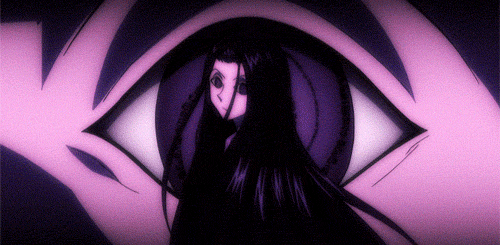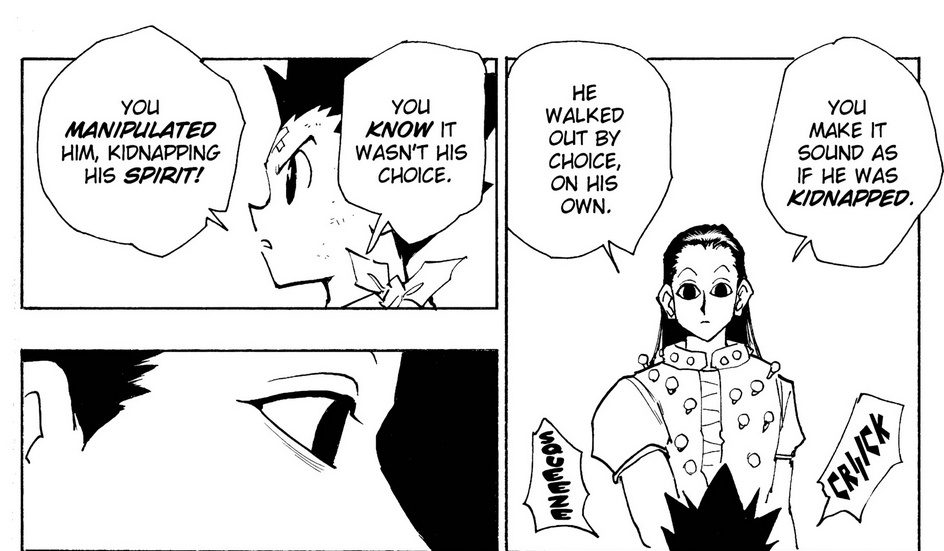my thoughts on hunter exam era illumi
I do not presume that all evil is rooted in a history of trauma survival. Most trauma survivors do not become perpetrators. But most perpetrators have a history of malignant trauma, that is, an experience of psychic or physical torture, or both, inflicted by another. I propose that this traumatic history finds a singular articulation in the interpersonal and intrapsychic operations of evil.
(SUE GRAND, from The Reproduction of Evil: A Clinical & Cultural Perspective)
My big late summer media focus has been diving back into Hunter x Hunter. I watched the 2011 series in 2014 or so, though I never watched Chimera Ant arc or beyond. Recently, I've gotten back into it as part of the HXH renaissance kicked off by the Media Club Plus podcast watchthrough. I've been watching the 2011 with some friends (+ also my housemate, separately), listening to MCP, as well as watching the 1999 adaptation and reading the manga roughly in parallel with our progress on 2011. We're just kicking off Heaven's Arena arc now, and I remember what is to come with inconsistent levels of accuracy. With that in mind, it's possible I'll confidently assert something below that will get jossed as I continue, but for the time being...
I. Love. Illumi Zoldyck. And I will explain my passions.
(Content note: this whole post is about child abuse. No spoilers past Zoldyck family arc.)
![]() rigormorphis commented that they were surprised about Sylvi from MCP's conviction that Illumi hypnotized Killua into killing Bodoro during the fifth phase of the Hunter Exam. It prompted me to reflect on my own assumptions about that scene. The way it's presented in the 2011 leans hard on the hypnosis visual language, as well as employing very spooky music.
rigormorphis commented that they were surprised about Sylvi from MCP's conviction that Illumi hypnotized Killua into killing Bodoro during the fifth phase of the Hunter Exam. It prompted me to reflect on my own assumptions about that scene. The way it's presented in the 2011 leans hard on the hypnosis visual language, as well as employing very spooky music.

For these reasons, I think I had also passively assumed Killua was hypnotized into making the kill. This prompted me to read through the relevant scene in the manga, in which it's much more ambiguous. Kurapika suggests the hypnosis hypothesis, which adds some credibility (as Kurapika is highly astute), but it's an unresolved question, at least at this point in the story.

Gon points out that the question is moot:

"Kidnapping Killua's spirit" can be read as hypnosis or just the mechanics of emotional abuse; determining the specificity is beside the point. Note that after Kurapika fields this question, the discussion similarly trails off, unresolved. Chairman Netero and co. are completely unbothered. Illumi could kill everyone in the room after receiving a Hunter licence without breaking any rules. The juxtaposition between the emotional and physical brutality of Illumi's abuse, the bureaucratic banality of the post-exam formalities, and the vagueness and lack of interest in determining whether they just witnessed a twelve year old be literally or just figuratively mind controlled into murdering an innocent man once again reminded me of Sue Grand's work, which is a touchstone for me when I think about the Zoldycks, particularly Illumi and Killua.
While its impact on the victim is stunning, permanent, and incontestable, the evil act seems ephemeral and fraught with ambiguity. [...] the familial and cultural memory for evil seems to be a systemic process in which awakening alternates with obfuscation. Facts about evil emerge, and call for action. And the facts recede into the unknown, intervention falters, and the prevailing myth is that nothing is really happening.
Illumi was an only child until age seven.
Through perpetration, the survivor who becomes a perpetrator attempts to share his no-self by evacuating it into his victim. [...] the mutual encounter of torture inevitably collapses into torture's mutual isolation. In a sense, a shared encounter with the no-self can only be found in the treacherous and elliptical loop of destruction.
The dichotomy of isolation and smothering closeness is immediately evident in everything about the conversation between Illumi and Killua. This is abuse logic 101: isolating a victim from others in order to facilitate the malignant codependence of abuse, where the boundary between self and other is occluded in an exploitative and oppressive manner. Illumi tells Killua he cannot have friends, he is constitutionally incapable of caring about people in that way; he will always have a place in the family home, have belonging in the work of killing.
Despite having been shown virtually nothing about Illumi's own upbringing, one may extrapolate from the way he behaves towards Killua, plus context clues like his age and character design. Killua responds to no other characters with the dread, terror, and submission he shows Illumi. His affect toward Silva, who is head of the family and very physically imposing, is vastly different. Their relationship is not close; when they have their father-son chat at the end of the Zoldyck family arc, it comes across like a business meeting.
It's clear that the bulk of Killua's highly abusive training was handled by Illumi personally.

Illumi's early childhood as an only child, and following years spent significantly older than his siblings, have been arranged to facilitate his development into the enforcer and proxy abuser of the rest of the children in order to preserve Silva as the Cool Dad who can be admired and respected. It's clear that the children have largely been trained separately from one another to prevent the kind of bonding that would work against the parents' intentions, and Illumi was the pilot project.
The environment around him has been designed to shape him into the thing he is now. Grooming one of your children into abusing your other child is, itself, child abuse. This is not to absolve Illumi of responsibility, not least because he is fully an adult by the time Killua takes the Hunter exam, but everything he tells Killua in this scene, I believe Illumi has internalized about himself:

Illumi's message to Killua isn't only that he's unable to have a life outside of being a killer, but that he's a killer among killers; he is one-of-them. This is the macro-level conceptualization of the micro-level "intrapsychic operation of evil"; Illumi's formative traumatic experiences have left him with a no-self, unable to connect with people who haven't brushed up against annihilation in such a way, compelling him to bring his victim into that moment of empty communion that is the act of abusive violence, one in which Illumi is in control, seeing and being seen.
It's telegraphed by Illumi's design and mannerisms. He's a soulless husk. He's a void person. Illumi's spirit was kidnapped a long time ago, and he's never gotten it back.
(His relationship with Hisoka, of all people, comes closest to putting the inevitability of this into question... but that's another conversation.)
There's another angle from which I find Illumi really fascinating... GENDAH.
Watching 1999 and 2011 alongside each other has been really interesting. Illumi's vocal performances across the two adaptations are very different, in a way that prompted me to think a lot about illumigender (not that it took much of a push.)
oomf recently pointed out that Illumi's design incorporates elements from both the female ghost archetype...

...and the transfem-coded master of disguise and manipulation e.g. Dongfang Bubai from Jin Yong's oeuvre... probably a good moment to mention, too, that Dongfang Bubai's main weapon is... needles.

Narratively, Illumi's malignant femininity expresses in a few ways. He's a little bit of a tumblr post eldest daughter, in the sense that despite being the eldest child and a very competent assassin in his own right (much stronger than Killua at this point in time!), he's not the one in line to become the head of the family, and seems set up to fulfill this disciplinary support role indefinitely.
The sense of evil parentification is strong, but Illumi is in no way a paternal figure. He holds a position somewhere between Silva's distant power and Kikyo's cloying micromanagement, on the same level as Killua as a sibling while also being very far apart, and... OK, you knew this was coming... he's kind of mommy coded. Sorry.

Sorry!!!
Rather than exhorting Killua to become stronger, his abuse manifests in this sequence as a smothering embrace, pulling Killua closer into the grip of the family. A sense of circlusive domination through enclosure is all over the visual language of this encounter.

Even Gon knows Illumi is mother (derogatory):

This leads us back to the layered meaning of the word "reproduction" in the phrase "reproduction of evil." Evil acts incline themselves both to repetition by the doer and to the generation of new patterns of violence among others.
In pain's ultimate moment, just before the suffering self disappears into oblivion, the tortured exists at the very apex of full presence and full revelation. Such a moment possesses an elemental allure: it is a breach in the wall of human insularity and isolation. [...] The more family and culture alienate us from experiencing ourselves and others as really real, really present, and really embodied, the greater the seduction of human violence. And because the alertness of agony inevitably collapses into the inertia of disappearance, because coma, death, and dissociation render opaque that which has just been exquisitely revealed, the perpetrator may require the endless repetition of pain.
Illumi didn't literally give birth to Killua, but also... kinda did, you know? He made him.
